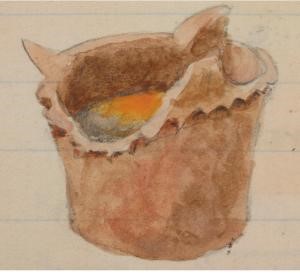
“It is for ‘Private Circulation’ and Blanche Haworth is the editor: it has brought out already a deal of latent writing capacity, and will be a first linking all round. It is called ‘El Couffa’ – a couffa being a native palm-leaf basket: we are said never to go out without carrying one, whence it stands on the title-page as our ensign!” 5 January 1912
————————————————————————————–
“Did Lilias write a practical handbook for missionaries?” is a frequently asked question among those interested in missions. The answer? No. Strategies for more effective ways of communicating with the people of the Arab world – methods, materials, cultural sensitivity, etc. – were a thread running through her diaries. She developed pamphlets with visions and practical approaches for co-workers and others with a heart for the Arab people. But never a “how to” on being a missionary.
The closest she came to providing practical advice, in written form, was through an in-house magazine – El Couffa (Arabic for open basket) – designed to connect the workers based in outposts throughout Algeria, in which were gathered bits of information and inspiration, news local and international to circulate amongst the stations and outposts. It featured an editorial column, The Letter “M”, written by Lilias, with pithy advice to missionaries.
Nowhere is Lilias’s counsel concerning ministry spelled out more clearly, with characteristic wit and humor, than in this open letter to missionaries, carried for eight consecutive issues – until the death of editor, Blanche Haworth. While they reflect a particular time and place – and, throughout, a quaintness of illustration and turn of phrase – there is a universal quality to her advice that would profit any Christian worker – then and now. And, in truth, anyone anytime who truly desires to convey to others the light and life and love of Jesus.
All eight editorials have been culled from these issues and now – at last – printed in full (see link at end of post).
Excerpts from The Letter “M” editorials:
“We need not look at ourselves or worry over our merits or demerits. Only let us be sure that we are with Him and we may be certain that He is leading us ever and through all circumstances, upwards.”
“For us, to be with Him on battle field or lonely out-post, in desert or storm or heat, or mental and physical exhaustion, in light or thick darkness, so long as He is near it is good for us to be there, better far than in some easier post elsewhere. . . ‘With Him.’ How every thought of praise or blame, merit or demerit, success or failure, sinks into nothing beside those two mighty words.”
“So the love we have to give to those among whom our Lord has placed us, if it is the true heavenly gift and not a shabby human imitation, is inexhaustible, for it too reaches a sea truly more ‘boundless than Ocean’s tide.’”
“What are our miseries? Shall we make a list of them and what shall we write opposite to them? Shall it be “this is very hard” or shall it be ‘with God?’. . . With Him in disappointments and troubled nights and much that perhaps we should shrink from if we had not meant it when we sang ‘Anywhere with Jesus.’”
“And again, in the arrangement of our day I think we must try hard for ‘gathered-up-ness’ and not leave the priceless moments just to the impulse of the moment.”
“We are here by the calling of God in this climate, under these circumstances, in this surrounding to be to all around us, European as well as native, unblotted epistles of Christ. It is a high calling – but He is able.”
“Once, years ago, there was somewhere a very good worker who had a way of not responding to the salutations of her fellow workers or of the natives. It seemed much a little thing, but the natives could not understand it, & when this worker spoke at meetings I am afraid that in the hearts of some of her hearers there was an echo ‘Yes! That was the one who did not answer when I salaamed her.’ So if we are conscious of having ‘a way’ however innocent, that rubs up our neighbours white or brown, let us give it up as St. Paul would have done. He says, ‘Let all that you do be done in love.’”
To read The Letter “M” letters in full, click below:

